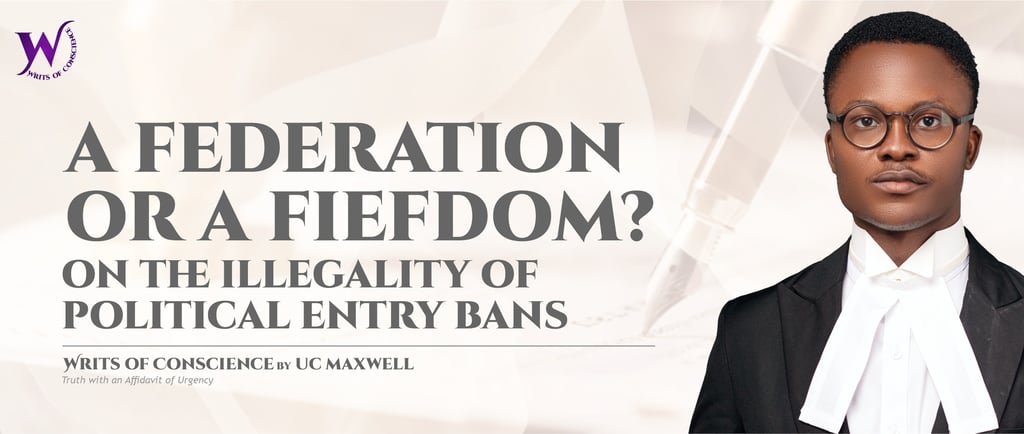A Federation or a Fiefdom? On The Illegality of Political Entry Bans
"The idea that a governor can wash his hands off the security of lives within his territory is legally indefensible."
UC Maxwell
7/21/20253 min read


In recent weeks, the political space has been rattled by unsettling statements credited to two Nigerian governors: Monday Okpebholo of Edo State and Hyacinth Alia of Benue State, directed at the person of Mr. Peter Obi, a former Governor and presidential candidate. In both instances, these governors implied that Obi’s entrance into their respective states was unwelcome, or at best, conditional. Most disturbingly, they declared, either directly or by implication, that the state could not guarantee his safety, and should anything happen to him, he would have himself to blame. This is not just politically distasteful; it is constitutionally repugnant.
Every Nigerian citizen, including Peter Obi, enjoys a fundamental right under Section 41 of the Constitution of the Federal Republic of Nigeria 1999 and Chapter 12(1) of the African Charter on Human and Peoples’ Rights (Ratification and Enforcement) Act, Cap. A9, Laws of the Federation, 2004 (which has the force of law in Nigeria) to move freely throughout Nigeria and to reside in any part thereof. That right is not subject to the whims of a state governor or to “political clearance” by any local authority. The right to freedom of movement is foundational in any federation. To deny it is to question the very fabric of national unity. When a governor implies that a political figure cannot freely enter a state within the federation or suggests his life cannot be secured therein, that governor is not just failing in his duty; he is threatening the Constitution itself.
In its judgment in Attorney-General & Commissioner of Justice, Kebbi State V. HRH. Alhaji Al-Mustapha Jokolo & Ors. (2020) 4 NWLR (Pt. 1715) 566, the Court of Appeal reprimanded the Governor of Kebbi State for restricting the movement of the Emir of Kebbi State. In its wisdom, applying the provisions of the Constitution and other legal instruments, Akomolafe-Wilson, J.C.A declared that the State Governor did not have such powers.
The idea that a governor can wash his hands off the security of lives within his territory is legally indefensible. While the Constitution vests security structures in the Federal Government, the political responsibility and primary duty to secure lives and property in every state rests on the shoulders of the governor. The notion of a “Chief Security Officer of the state” may be more political than legal, but it carries an undeniable moral and administrative obligation. To declare a security vacuum or an inability to protect a citizen simply because he belongs to another political persuasion is a failure of governance and a breach of oath.
Moreover, such declarations are not neutral. They carry the weight of veiled threats and dog whistles to violent actors who may interpret them as a license to harm. When a governor speaks, the thugs hear. The consequences of such recklessness cannot be overstated. No public official should, under any guise, make statements that weaken the assurance of safety for law-abiding citizens who seek only to travel, engage, or interact with fellow Nigerians. In the case of Benue State, the languishing displaced persons, displaced by the ineptitude of the government, were denied the goodwill of a selfless person due to the utterances of a governor.
This pattern, targeting Peter Obi in both Benue and Edo, is especially troubling. It suggests a coordinated intolerance for dissenting political actors and a growing abuse of public office for partisan suppression. It is important to remind these governors that they were not elected to build party fortresses, but to uphold the law for all. Any state where a citizen’s right to move freely is curtailed ceases, in that moment, to operate within the boundaries of constitutional democracy.
If such conduct goes unchallenged, it sets a dangerous precedent. Tomorrow, it may not be Peter Obi. It may be any one of us, journalists, activists, students, professionals, denied entry into a part of our country for holding unpopular views or daring to speak truth to power. The story of Idris Abubakar (Dadiyata) continues to reverberate. That is not a country ruled by law. It is one ruled by fear.
The Constitution does not grant governors the power to pick and choose who deserves safety. Security is not a favour extended to allies and withheld from critics. It is a right. Governors who fail to understand this are not just failing Peter Obi. They are failing Nigeria.
UC Maxwell is a Legal Practitioner who brings clarity and conviction to national conversations. His writings focus on constitutionalism, governance, and the rule of law.




